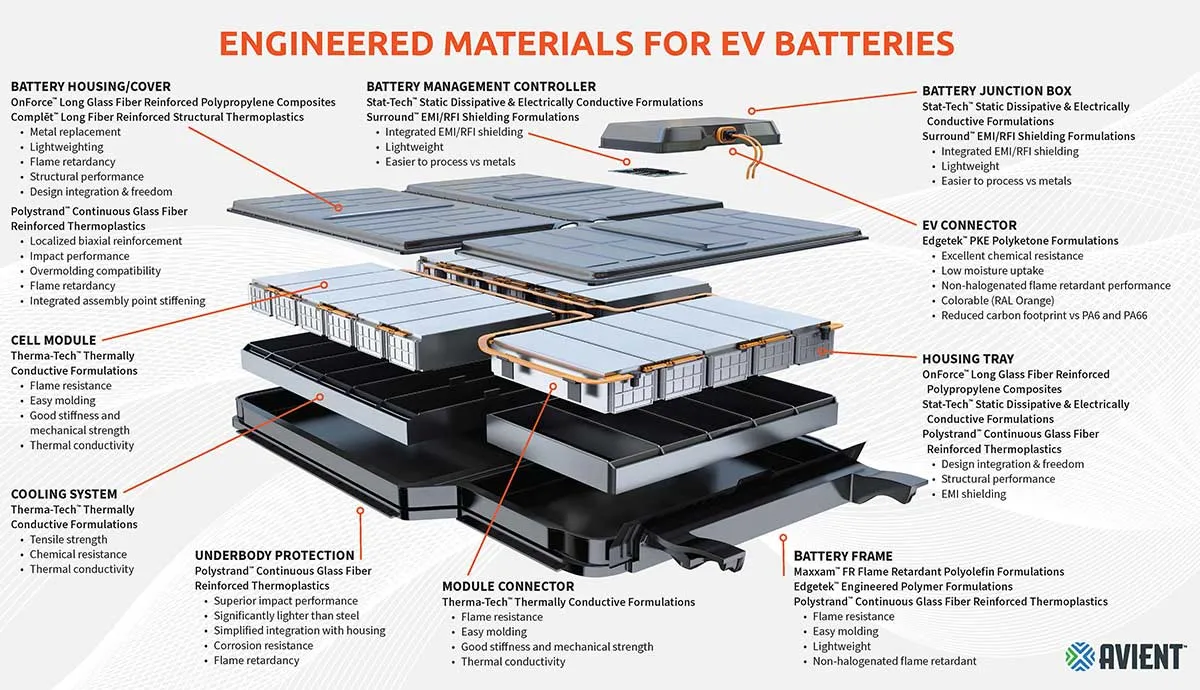The rapid growth of the electric vehicle (EV) industry is generating extensive research and development in battery technologies. While most batteries are traditionally metal-based, there are significant advantages to using polymers (plastics) instead, especially with recent advancements in polymer science that make using these materials in electric vehicle batteries possible. So, how can engineered polymers enhance EV battery design and performance?
1. Weight Reduction: One of the primary advantages of using polymers in EV batteries is the significant weight reduction. Polymers have a considerably lower density than metal, allowing for lighter and more energy-efficient batteries. This weight reduction can directly impact the overall performance of electric vehicles, enhancing their acceleration, range, and energy efficiency.
2. Enhanced Safety: Polymers can be engineered to provide flame resistance and can reduce the risk of thermal runaway, which is critical for EV battery applications. In the event of a crash or impact, high-strength polymers with good structural performance reduce the threat of deformation and fracture, minimizing the risk of leakage and exposure to hazardous materials.
3. Design and Processing Flexibility: The versatility of plastic opens up new avenues for battery design and integration within electric vehicles. Polymers can be molded into complex shapes, enabling the development of custom battery configurations that can fit into limited spaces. This design flexibility facilitates optimizing space utilization within EVs, allowing for improved vehicle performance and increased energy storage capacity.
4. Thermal Management: Thermal management is crucial to battery performance and longevity. Engineered polymers can be designed with specific thermal properties, possessing either excellent thermal conductivity or enabling efficient heat dissipation from the battery cells. This characteristic helps to mitigate the risk of overheating and allows for more robust cooling systems, thereby enhancing the overall lifespan and reliability of the EV battery. Thermally conductive formulations can also be electrically isolative or conductive, combining thermal performance with protection from electrostatic discharge and electromagnetic interference, depending on the needs of the specific component.
5. Cost-Effectiveness: Using engineered polymers in electric vehicle batteries can contribute to cost savings throughout the manufacturing process. Polymers can be processed at a lower cost than metals, reducing overall material expenses. Additionally, polymers' lightweight nature lowers transportation costs and simplifies assembly processes. Moreover, the ability to mold polymers into complex shapes reduces the need for additional parts, simplifying battery pack assembly and lowering labor costs.
6. Environmental Impact: Engineered polymers offer significant environmental benefits compared to the metals they are replacing, such as aluminum. Polymers can be recycled more easily and efficiently, reducing the environmental footprint of the battery production and disposal processes. Furthermore, the lighter weight of polymer-based batteries contributes to improved energy efficiency, reducing greenhouse gas emissions during vehicle operation.
Using engineered polymers in electric vehicle batteries presents numerous advantages over traditional metal-based materials. The weight reduction, enhanced safety, design flexibility, thermal management, cost-effectiveness, and positive environmental impact make engineered polymers a compelling choice for the EV industry. As research and development continues, we can expect further advancements in battery technologies, leading to even more efficient and sustainable electric vehicles.
